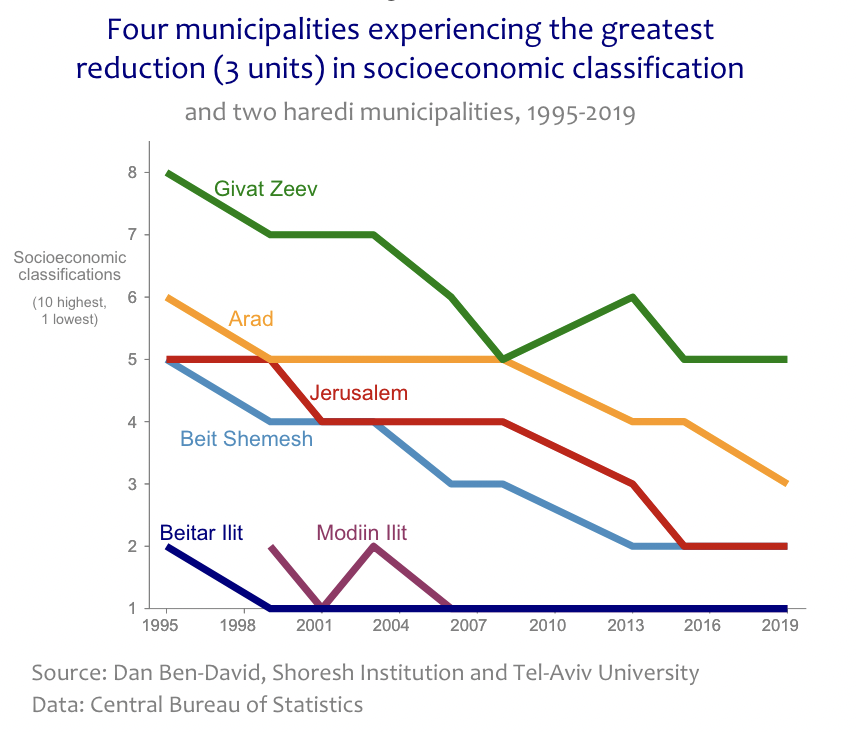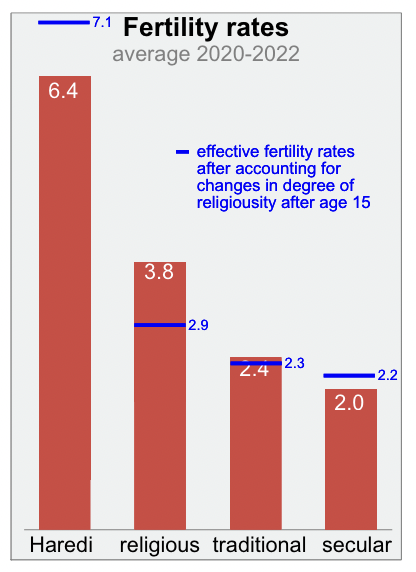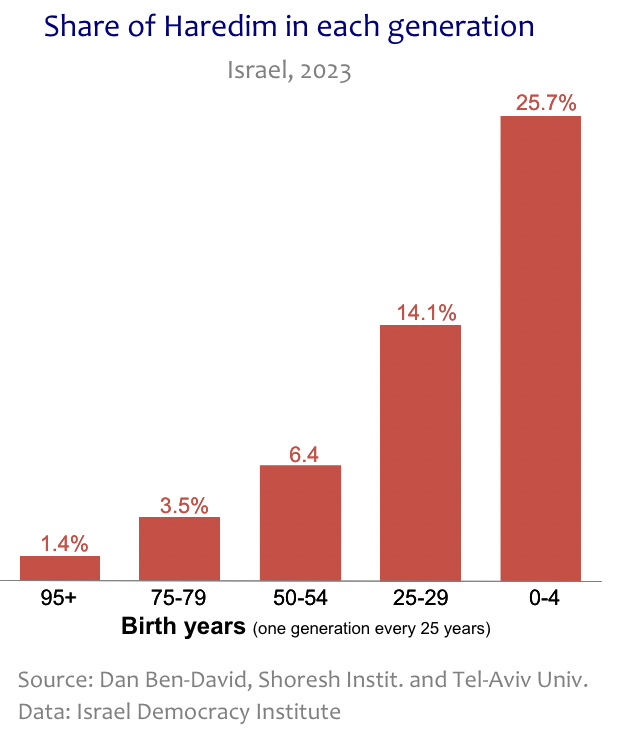New research by the Shoresh Institute for Socioeconomic Research, conducted by Prof. Dan Ben-David, stressed the significant transformation underway in Israel with the Haredi (ultra-Orthodox) population. The report, titled “Jerusalem and the Increasingly Haredi Towns: A Parable for Israel,” underscores the rapid growth of the ultra-Orthodox (Haredi) community and its far-reaching implications for the country.
Talking to TML, Professor Ben-David, the research’s author, summarized some of his findings. “We’ve conducted this research to show that Israel is in an unsustainable trajectory. The Haredi population doubles its share of Israel’s population in every generation. Haredim are 6 percent of the country’s grandparents but are 25% of today’s infants. This growth impacts the population distribution within towns, alongside a steep decline in those towns’ living standards. This is already well underway in several Israeli municipalities, allowing a glimpse into the nation’s future. These towns, including Jerusalem, Beit Shemesh, Arad, and Givat Zeev, illustrate a broader national trend. If this trend continues, it’s unclear how Israel will have physicians, doctors, architects, lawyers, and soldiers. It isn’t just the issue of working but of maintaining Israel’s development, so I don’t mean it lightly that we need to take extreme measures in the country’s educational system and to make sure that every kid is going to school and learning science, math, English, history, like other developed countries.”

(Courtesy Shoresh Institute)
Over the last 25 years, Professor Ben-David has identified a direct correlation between the increase in the Haredi population in several cities, the economic decline of these areas, and a decrease in the number of children enrolled in local primary schools. “This is beyond a generational problem. It’s a combination of the Haredi high fertility rates, with 6.4 children per family in comparison to the rest of the country. Also, there is the problem that many of these cities, where the Haredi are moving in, are observing the opposite movement of secular people, who are moving out. For example, Givat Zeev, near Jerusalem, had no Haredi until 14 years ago. 80% of the city was secular Jews, but today, 80% of this town is Haredi. Other cities that saw a similar phenomenon were Arad and Bet Shemesh.”
Emphasizing the critical need for education reform within the Haredi community and its broader implications for Israeli society, Professor Ben-David said, “If the Haredi deprive their kids of education, they also deprive them of being high-income earners. With this, they also deprive Israel of improvement. They need a modern society and army, but somebody needs to do it. It’s life in a modern world, and no one likes to have obligations, but everyone is paying the price regardless.”
Many Haredi want to be a part of Israeli society, but their leadership and the communities they’re inserted in also make it discouraging to do it. Because many of them don’t get a basic education, getting an advanced education is especially harder for them, and many of them drop out.
“Many Haredi want to be a part of Israeli society, but their leadership and the communities they’re inserted in also make it discouraging to do it. Because many of them don’t get a basic education, getting an advanced education is especially harder for them, and many of them drop out. When the youth want to integrate into Israeli society, for many of them, it feels like it’s too late to overcome all these barriers,” he explained.

(Courtesy Shoresh Institute)
Ben-David illustrated the demographic challenge with a stark comparison: “About 6% of the Israeli population above 50 is Haredi, but 25% of the population from ages 0 to 4 are Haredi. Tomorrow, these people are going to school. After that, they’re getting a job. If we don’t put these kids in school, the dream of Israel will be over for them, but also for the rest of the country. You can’t have 25% of the population unable to contribute and expect Israel to continue as a developed country. We need them as engineers and doctors in the army. The time for this change is now. This is a point of no return.”
According to him, Israel can’t afford this, but the Haredi got into politics, and this corrupted them. “We have a right-wing government that is willing to give the Haredi whatever they ask as long as it allows them to not have to negotiate with the center and the left. In 20 or 30 years, the Haredi won’t need a corrupt Prime Minister to rule. The demographics will ensure that they can do whatever they want themselves. They have no education about the democratic system, and they won’t have problems stripping the Israeli democracy down. But this will also be the end for them since they won’t be able to protect the country.”
Give the gift of hope
We practice what we preach:
accurate, fearless journalism. But we can't do it alone.
- On the ground in Gaza, Syria, Israel, Egypt, Pakistan, and more
- Our program trained more than 100 journalists
- Calling out fake news and reporting real facts
- On the ground in Gaza, Syria, Israel, Egypt, Pakistan, and more
- Our program trained more than 100 journalists
- Calling out fake news and reporting real facts
Join us.
Support The Media Line. Save democracy.


The solution is to enforce the law and fix our schools. I don’t mean that the Haredi should be ‘targeted.’ Israeli schools are crummy to begin with, especially if we compare them to developed countries. This issue isn’t about the Haredi but about all of Israel.
To address these pressing issues, Ben-David called for immediate and comprehensive reforms. “The solution is to enforce the law and fix our schools. I don’t mean that the Haredi should be ‘targeted.’ Israeli schools are crummy to begin with, especially if we compare them to developed countries. This issue isn’t about the Haredi but about all of Israel. What happened to these cities tracked in the research is a wake-up call to what the future will look like if we don’t act now. Israel can’t afford to become a Third World country because the country won’t be able to defend itself.”
He also highlighted the broader context of educational deficiencies within Israel. “If we take into consideration other population groups in Israel, such as the Arabs, then almost 50% of the Israeli kids are getting a ‘Third World education.’ If we don’t have a First World education, we won’t be able to have a sustainable economy, welfare, and security. At this point, Israel’s enemies will be able to destroy us.”
Dr. Shai Stern, a law professor at Bar Ilan University and deputy chairperson at the Haredi Institute for Public Affairs, told TML, “There are several organizations, some of which include former high-rank IDF officers and others from other security organizations that try to accommodate Israeli security threats, without getting into the conflict of values between Tora learning and equality. They emphasize the real threats and the needs instead of focusing on whose values should be above the Israeli political sphere.”
One of the Israeli organizations that managed to successfully integrate Haredi in the IDF in the Nahal Haredi, formally known as Netzah Yehuda Organization, is a unit in the IDF specifically designed to accommodate Haredi Jewish men who wish to serve in the military while adhering to their religious practices. Established in 1999, they care for 3,000 active soldiers and 21,000 veterans.

(Courtesy Shoresh Institute)
According to Adrian Treger, the Vice President of External Affairs of Nahal Yehuda, his organization offers Israeli society a “blueprint” for accommodating the world’s modern needs to the ultra-Orthodox requirements.
“The debate about integrating the Haredi in the world has been around for many years, but very few organizations have managed to do it right. We agree that the Haredi have special requirements, but the society should already have solutions for that. Opportunities, especially for the Haredi youth, can’t be limited because they have specific needs. The solution is to create an environment where they can succeed, and the Nahal Yehuda is an example of success on how to do this, where the soldiers can respect their ultra-Orthodox traditions, their communities, and serve the country,” Adrian told TML.
The debate about integrating the Haredi in the world has been around for many years, but very few organizations have managed to do it right. … These individuals are highly intelligent but have never learned the tools they need to succeed.
Adrian explained, “This includes also having a viable path for them after the army, and we know that Haredi education has a huge gap in comparison to the education of secular Jews. These individuals are highly intelligent but have never learned the tools they need to succeed. In the Nahal Yehuda, we also provide these tools, help them complete their education, and prepare them to continue into higher education or find the jobs they want.”
Adrian is confident that this integration blueprint can also be implemented in the educational system. “Currently, many Haredi men are doing courses to try to learn programming to join the high-tech labor force, but they have a drop-out rate of 80%. It’s a colossal failure. In comparison, because Nahal Yehuda understands the needs of the ultra-Orthodox society, we understand there are no shortcuts. Some of our programs have a success rate of 100%.”
“The current impasse to draft of the Haredi is a delicate moment that can have a negative reaction, especially if the youth that thinks of joining the army gets a negative understanding of what the IDF is,” he said. “If many Haredi come out against it on Sunday, are they going to jail? The government just released several terrorists back to Gaza, and now they are putting the Haredi in jail? The Haredi who study in yeshivot believe that what they are doing is helping protect Israel, and telling them to stop doing it is a big change. Still, many members of the Haredi society aren’t learning in a yeshiva. We should focus on stopping antagonizing them and helping them succeed in life, which will lead other Haredi to take this path to success.”
It is still unclear what will happen on Sunday. The latest declarations from the IDF say that they will just renew processes for the first stage, meaning that it could take months before even one person is recruited.
Professor Stern explained to TML, “It is still unclear what will happen on Sunday. The latest declarations from the IDF say that they will just renew processes for the first stage, meaning that it could take months before even one person is recruited. As for the question of who should be recruited first, I think trying and forcing solutions without exhausting all the political possibilities is a mistake. True, it may take a bit longer, but many players already realize that continuing with the narrative conflict is not valuable to the Israeli society or to the ability of Israel to handle its security threats.”
“These officers were attacked last week when they came to Rabbis’ homes to discuss solutions rather than forced actions. Forced actions will probably lead to resistance within the ultraorthodox society, and even moderate elements among ultra-Orthodox society will not be able to continue negotiating with the authorities for change,” Professor Stern reminded.
He says, “The IDF finds itself in a very complicated position. On the one hand, there’s the legal order to start with the processes, while on the other hand, there’s no real advancement in the political arena. I think that the IDF should not be the one to decide on these ultra-sensitive social issues. The fact that the legal system left these sensitive decisions to the IDF is problematic as the IDF should not dictate policy or deal with social issues, but rather handle security ones.”
Organizations like Nahal Yehuda are designed to integrate Haredi Jewish men into the IDF while accommodating their religious practices. However, amid these efforts, a new challenge has emerged following the Shas Council of Torah Sages’ recent directive.
The spiritual leaders of the ultra-Orthodox party have instructed their followers to disregard the initial draft orders issued by the Israel Defense Forces. “As of now, while no legislation has been agreed on the status of the yeshiva students, do not answer any draft orders, including initial orders, and you should not show up at draft centers.”